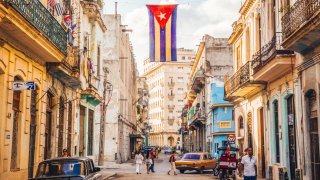The Lights Go Out in Cuba
Cuba’s power crisis won’t light up prospects for the end of the U.S. sanctions regime.
China, although never as close to Cuba as the old Soviet Union was, does have a positive political relationship with it and is an important economic partner. In theory, it could have a role in Cuba’s current plans to increase solar energy production, as it is the world’s largest producer of solar panels. However, Cuba has not produced a regulatory framework that would encourage such investment in solar energy.
Also, it lacks the money to purchase panels, and Chinese firms are not likely to want to extend credit to a country that is already heavily indebted and behind on its payments. China also has other priorities in the region. It has invested in infrastructure from Panama to Ecuador and Peru. It buys large quantities of agricultural and mineral products from Brazil. Taking on Cuba’s problems seems unlikely, tempting as it may be for it to aggravate Washington.
Mexico, which has a left-leaning government and a long history of friendly relations with Cuba, is providing some additional oil. 412,000 barrels of crude is on its way to Cuba. While this is doubtless welcome, it would amount to only a few days of Cuban demand. And Mexico cannot provide more than occasional help as its production has dropped in recent years. It has been reported that Mexico is looking to work with other potential suppliers on a longer-term solution.
The U.S. Won’t Touch This
As for the United States, it remains at a vast political distance from Cuba despite its geographic proximity, and a “whole of government” effort such as that outlined earlier is implausible. And, of course, it would make no sense without the rollback of its sanctions regime. However, the history of efforts to ease bilateral tensions does not bode well for such outreach.
Jimmy Carter’s attempt at rapprochement, which included the opening of interest sections in both Havana and Washington, came to a frustrating end as Cuba ramped up support for revolutionary regimes and insurgencies and, in 1980, let 125,000 Cubans suddenly depart the country (the “Mariel boatlift”). Bill Clinton was stymied when the Cuban military shot down two civilian aircraft piloted by a Cuban exile group while flying within Cuban airspace (on an admittedly provocative mission). This, in fact, led to the codification of much of the U.S. sanctions regime into law as the Helms-Burton Act.
Barack Obama went as far as any U.S. president could in removing sanctions that were not locked into statutory law. However, this, in turn, was reversed by Donald Trump. The Biden administration partially reversed Trump’s decisions but has not gone as far as Obama did. Its refusal to make Cuba a priority is likely derived from a straightforward calculus. From Castro through to the current leadership, Cuba has always made it clear that any easing of sanctions on the part of the United States will have to be its own reward. There can be no quid pro quo in terms of democratic reforms.
Certainly, a case can be made that sanctions have outlived whatever usefulness they may have once had for U.S. policy interests. But Cuba’s insistence that the United States simply abandon them does not provide the minimum amount of political cover necessary for any movement on the American side, especially in our sharply divided and closely contested domestic environment. And with global crises from Ukraine to Israel-Palestine to Taiwan on the front burner, there is little incentive for any U.S. administration to reach out to a Cuban government that offers so little in return.
The United States has offered humanitarian assistance to Cuba in the past after natural disasters. However, in the current instance, the Cuban government has made clear that its only “ask” is the unconditional end to sanctions, a political impossibility. Thus, the United States is likely to remain an observer as the lights continue to flicker across the Florida Straits.
Richard M. Sanders is a Senior Fellow, Western Hemisphere at the Center for the National Interest. A former member of the Senior Foreign Service of the U.S. Department of State, he served in embassies throughout Latin America and in positions in Washington dealing with the region.
Image: Shutterstock.com.

